
The Business of Fashion
Agenda-setting intelligence, analysis and advice for the global fashion community.

Agenda-setting intelligence, analysis and advice for the global fashion community.
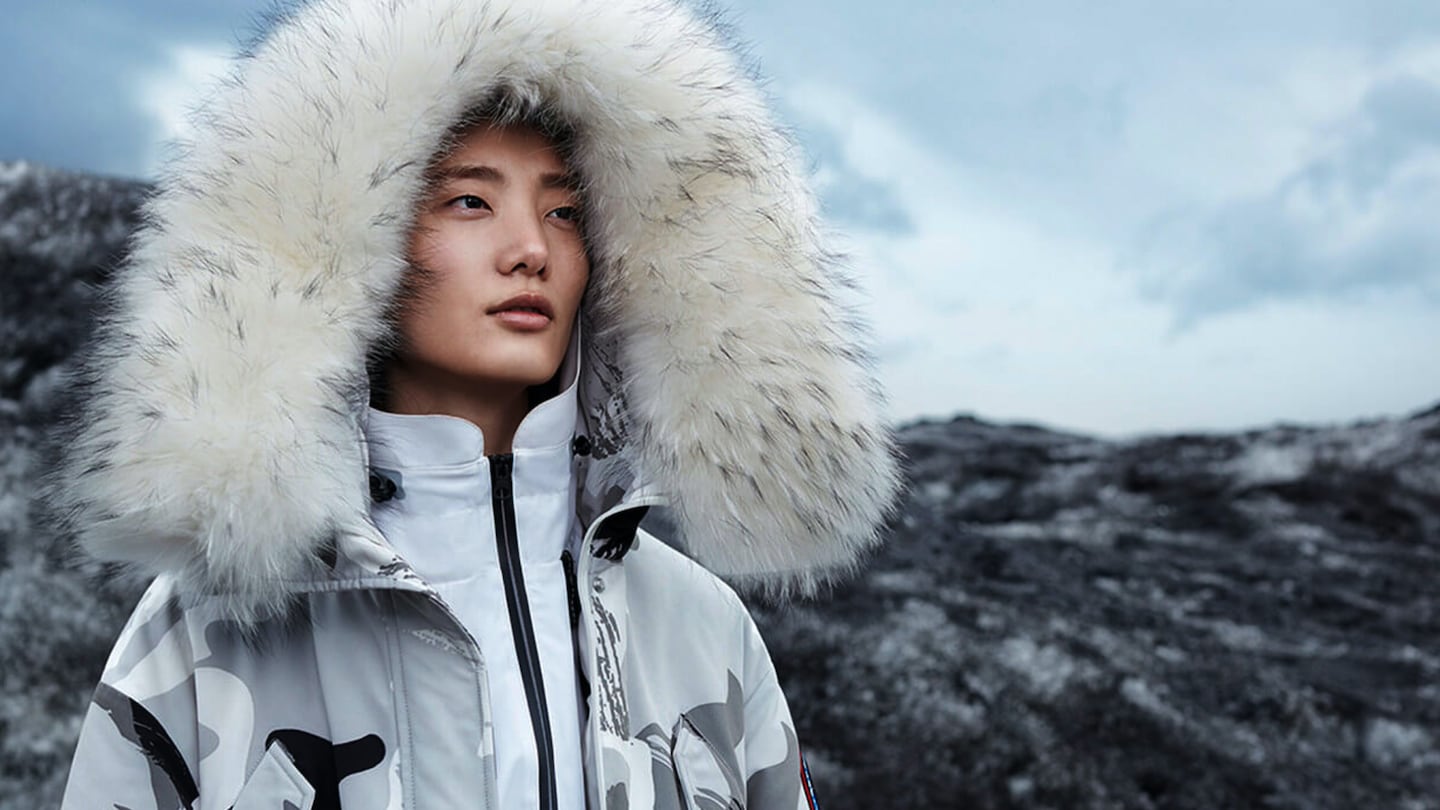
Hello BoF Professionals, welcome to our latest members-only briefing. China’s colossal size and dynamism makes it a top priority for any global business, but it remains opaque to many in the fashion industry. Leveraging our rare access and local knowledge, the BoF China team demystifies the Chinese market with weekly industry analysis and the wider socio-cultural context you need to sharpen your focus.
HANGZHOU, China — Nanjiren, Bosideng, Bauo and Chando might not ring any bells, but they're big money in China.
Last week, Alibaba-owned e-commerce platform Tmall released figures following its Chinese New Year shopping festival that ended January 28. The above brands were top sellers in their respective fashion and beauty categories, beating out pricier foreign players.
The festival is a major moment for domestic and foreign retailers alike. Last year, Chinese consumers spent 926 billion yuan ($189 billion) while welcoming the Year of the Dog. However, a slowdown looms overhead with China's economy growing at its slowest pace in 28 years, and new year's spending is being monitored as a barometer for consumer sentiment in the months to follow.
ADVERTISEMENT
Though China’s week-long holiday has yet to end, Tmall’s pre-holiday report speaks volumes. The country’s largest B2C retail platform — stocking over 180,000 local and foreign brands — published sales figures for its top nine best-selling categories, including apparel and accessories, beauty, health and wellness and home technology. And if the numbers are any indication, homegrown brands are having a promising start to the new year.
Peak Beauty? Not Yet
According to Tmall’s data, China’s booming beauty market isn’t showing signs of slowing down. The sector’s growth is outpacing all of the platform’s other categories at 55.6 percent year-on-year, with apparel and accessories lagging behind at 8.9 percent.
Within beauty, Tmall’s skin care, cosmetic and fragrance subcategories all hit year-on-year growth rates of over 70 percent. Skin care, in particular, takes the cake at 77 percent.
Though Tmall stocks countless foreign mass market and "prestige" brands from Maybelline to Dior and Estée Lauder, five of beauty's top ten performers were local players. Parisian L'Oréal stood strong at second place, but first and third went to local players Bauo and Audala. The former, whose products include a 68 yuan ($10) 24 karat gold leaf ampoule serum, used timely influencer marketing to boost its sales, while Hangzhou-based Audala counts a 168 yuan ($25) "bust essential cream" among its bestsellers.
Also on the list are My Perfect Diary and Chando. The former opened its first brick-and-mortar store in Guangzhou last week, while the latter's Singles' Day 2018 sales exceeded one hundred million yuan (around $14.8 million) in under an hour.
Homegrown Feels the Heat
As for apparel and accessories, low temperatures are proving lucrative for Made-in-China designers, as Tmall named Nanjiren and Bosideng its top two brands in the category. This year’s title holder Nanjiren is a household name in the country, thanks to its affordable warm underwear and fleece home wear.
ADVERTISEMENT
The brand's products retail at 70 to 100 yuan (around $10-15) per set, a steal compared to Uniqlo's Heattech tops, which average at 99 yuan apiece. Greater China remains one of the Uniqlo's strongest markets and the brand made it into the category's top 10 brands, but it still lags behind Nanjiren in Tmall's results, placing sixth.
Runner-up Bosideng is China's largest down jacket maker and seen as the domestic affordable alternative to Canada Goose and Moncler — its best-selling outerwear tends to go for under 1,200 yuan (around $177), a steal compared to rivals' $1,000 puffers.
The year ahead looks promising for Bosideng, whose share price rose by 132.8 percent last year, the third highest increase among Hong Kong stocks during the same period. Though it already operates over 7,500 outlets at home, the brand has its sights set abroad. At its runway show at New York Fashion Week last September, the brand meshed traditional Chinese calligraphy and pictographics with its functional fabrics and signature outerwear, worn by the likes of model Alessandra Ambrosio.
Singles’ Day vs. Spring Festival
Many in the west are now familiar with Alibaba's Singles' Day shopping extravaganza, which saw the retail giant log $31 billion in sales during its 10th anniversary event last November. Singles' Day has famously been a big money maker for foreign companies such as Apple and Dyson, and Tmall stocks more European luxury brands than ever — last year, a total of 35 luxury designers such as Valentino, Ermenegildo Zegna, Bottega Veneta and Stuart Weitzman launched flagship stores on Tmall's Luxury Pavilion platform.
In light of this, why does Tmall’s New Year’s shopping festival favour local brands?
Gifting traditions play a part. The new year’s travel rush, known as "chun yun," is the world’s largest human migration — according to the South China Morning Post, a total of 2.99 billion trips are expected to take place this year as city-dwellers travel to spend a rare holiday with their families.
Local Chinese brands have moved beyond the traditional position of being well priced, but old fashioned.
According to Remi Blanchard, research project leader at Daxue Consulting, Nanjiren’s strong start to the year is no surprise, as the brand benefits from a special tradition relating to the festival. “In the old times, Chinese people used to buy new clothes, especially underwear, for the new year … the tradition remains and underwear is a popular gift in today’s China,” Blanchard tells BoF.
ADVERTISEMENT
As such, Spring Festival is to local brands and marketers what the winter holidays are for foreign brands. “Chinese brands are committed to dedicating marketing resources during this important festival, when consumers buy winter clothes for families and loved ones,” echoes Jason Yu, general manager for Greater China at consultancy firm Kantar Worldpanel.
Rather than the Cartier, Bulgari and Louis Vuitton presents favoured by affluent gift-givers, according to Hurun's annual Chinese luxury consumer survey, gifts purchased for China's nation-wide homecoming are more practical. "Affordable but [high] quality brands are always popular items," says Yu.
The same goes for local beauty brands, many of whom are using natural beauty, Chinese medicine concepts and Chinese heritage to rival foreign players. Though Chinese beauty consumers have traditionally opted for more appealing and "trustworthy" foreign brands, the stigma around Made in China beauty is slowly being lifted, and local brands are expanding beyond the mid to low-end market segments they have long occupied.
Aforementioned Chando, who focuses its marketing efforts on its use of natural ingredients, Pehchaolin and The Herborist are among a cohort of Chinese beauty brands marketing to younger consumers through influencers — during Singles' Day, Chando enlisted an impressive army of celebrities to promote its products, from Nana Ouyang to William Chan. Last November in the lead-up to Singles' Day, Pehchaolin collaborated with Oriental Royal Jewellery to release a special edition cosmetics set inspired by historical artefacts.
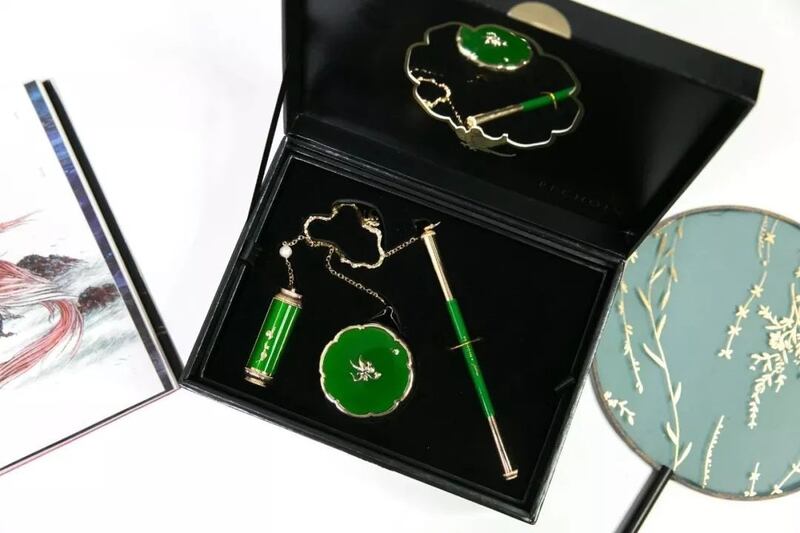
Pehchaolin's special edition cosmetics line, inspired by Chinese historical artefacts | Source: Pehchaolin
For fashion brands, it doesn't hurt that homegrown designers such as Li Ning, Clot and Peacebird (who came in tenth among Tmall's best-selling brands,) are carrying clout among streetwear fans, since making their New York Fashion Week debut last February during Tmall's China Day event.
Referring to Bosideng, Yu traces its recent success to the brand expanding its product porfolio, introducing new fabrics and styles, and hiring international celebrity influencers to appeal to a younger demographic. “[Local Chinese] brands have moved beyond the traditional position of being well priced, but old fashioned.”
Though economic headwinds may account for budget-conscious Chinese consumers opting for wallet-friendly purchases over foreign branded alternatives, e-commerce platforms such as Tmall are also fulfilling the spending needs of a wider cohort of consumers. This extends to shoppers in rural areas and lower tier cities, as well as lower income groups.
“Because of the rise of e-commerce platforms, retailers are giving lower income groups a greater opportunity to buy goods in their price range,” Dr. Keyu Jin, associate professor of economics at the London School of Economics told BoF.
Hence, the rise of China’s affordable homegrown players isn’t simply symptomatic of a slowdown, but points to the growing potential for domestic brands within the country’s wider population of demanding and value-centric shoppers.
“Availability from online platforms makes it easier to reach them rather than building physical stores,” Jin tells BoF. But brands shouldn't forget that it's value, and not affordability, that these consumers prioritise.
To win their hearts, foreign brands will have to compete with local players in both quality and price. “They’ll also go up the quality ladder of consumption goods, there’s no doubt.”
时尚与美容
FASHION & BEAUTY

Source: CeraVe
Cosmeceuticals Crackdown Shakes Beauty Industry
It is now illegal for products registered as cosmetics or skincare in China to be marketed as medical, or claim to have medical properties or benefits, according to a statement released by China's Food and Drug Administration (CFDA) on January 10. Beijing Daily reported that e-commerce platforms Taobao, Tmall, JD.com and Suning have since removed most mentions of medicinal beauty products from their sites, whereas L'Oréal-owned French drugstore beauty brands La Roche-Posay and Vichy have wiped mentions of "medical benefits" from their platforms. Beijing Daily reporters also noted that Asia's largest health care and beauty care chain store Watsons has removed advertisements and promotions around cosmeceuticals in its Dongcheng and Chaoyang chains. The news was especially inconvenient for L'Oréal — whose CeraVe brand made is Chinese debut on the same day the CFDA announced its ban. The announcement is a small step towards putting China on equal footing with FDA standards, which distinguish medical and cosmetic products as well as devices. (Xinhua)
China Keeps H&M Hopeful
In spite of a 10 percent drop in quarterly profits released by the H&M Group, the Swedish company's share price recovered, thanks in part to its strong performance in the China market. The country's fourth quarter sales surged 31.7%, making it one of H&M's top five global markets behind the likes of the US and Germany. Throughout the fiscal year, the group — whose brands include H&M, Cos, Arket and Weekday — opened 33 new stores in 28 cities in Mainland China, now totalling 465. Total annual sales in China hit 8 billion yuan (around $1.18 billion), up 13.3 percent from 2017, and over 6 million members registered for the H&M Club loyalty program throughout the year. This adds the Swedish giant to the likes of Burberry, LVMH and Tiffany & Co, whose recent earnings reports revealed better-than-expected results despite a much-feared slowdown. (iQidian)
Global Sneaker Resale Giants Eye Chinese Millennials
The global sneaker resale market is estimated to be worth $6 billion, and China has emerged as a new frontier for streetwear fans — its sneaker resale market is worth over $1 billion, says StockX chief executive and co-founder Josh Luber. The country's millennial-driven streetwear consumption grew 62 percent between 2015 and 2017 according to a report released by OFashion and Nielsen — 3.7 times more than other countries. Across the globe, retailers are taking note: not only did Stadium Goods partner up with Alibaba's Tmall early on in 2016, the sneaker and streetwear marketplace has since been acquired by Farfetch, placing it in a prime position to harness the logistical might of Farfetch's partner JD.com. Luber's StockX is also on the lookout for a Chinese partner, which will put the western giants up against local players such as Yoho!'s UFO, Du and Douniu. As strategic partnerships up the stakes in China's longstanding retail rivalries and bring new competitors into the mix, could its cities become the next global streetwear capitals? (Highsnobiety)
科技与创新
TECH & INNOVATION
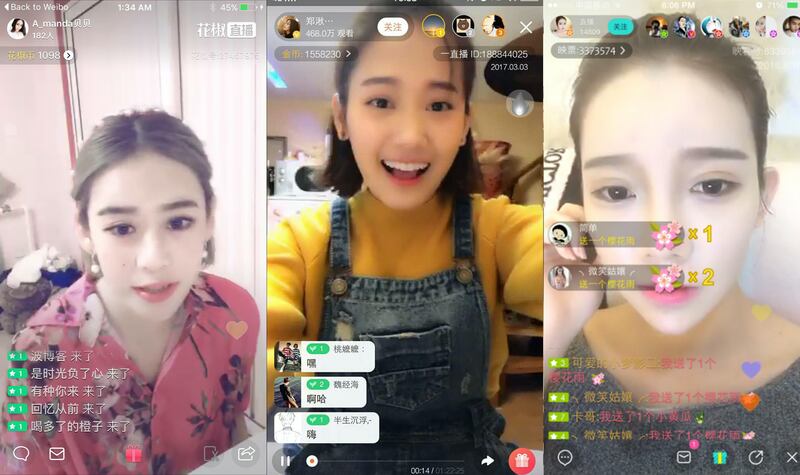
Chinese live-streamers | Collage by BoF
Can Livestream’s Virtual Gifting Culture Be Tamed?
Live-streaming is big business in China: Deloitte estimated that the country's industry made $4.4 billion last year, and more users are watching on apps Inke, Huajiao, Yizhibo and YY than ever before. Thanks to them, some Chinese livestream hosts make upwards of $100,000 a week. Why? Fans are satisfied when their favourite hosts receive a gift and show their appreciation — sending out more "tips" can increase an account's rating, and hosts can make a point of welcoming highly-rated accounts to their streams — to the extent that female hosts have rewarded big spenders with a date. This also means that interactions can get uncomfortable for hosts, who receive offers to strip and send out personal contact details in exchange for cash. As such, the livestream industry is already being eyed by regulators: last week, Hubei became the first Chinese province to issue standards aiming to crack down on misbehaving hosts, including preventing minors from live-streaming solo and requiring platforms to set up a 24-hour reporting channel for viewers. However, other aspects of the requirements are questionable: though they say female hosts shouldn't sport sheer or sexy outfits, male hosts' style choices went unmentioned. (Tech in Asia)
Beijing Pledges to Fast-Track 5G Licenses Amid Huawei Overseas Pushback
Looking for ways that the tech industry can help overcome economic jitters, Beijing is aiming to push domestic usage of 5G mobile technology in a bid to bolster content consumption. In a notice published by China's National Development and Reform Commission on January 29, the state planner announced its plans to hasten the granting of 5G commercial licenses as well as 4K television channels across the country. The pressure is on: The US filed charges against Chinese telecom giant Huawei the day prior, and the UK and EU are considering proposals to ban Huawei from its 5G networks. Seeing as the information consumption market was worth 5 trillion yuan ($741 billion) last year, it's no wonder Beijing is banking on 5G for a boost: take the Spring Festival Gala on February 4, which was broadcast using 4K, 5G, VR, AR, AI technologies. (SCMP)
Ride-Hail Driver Receives Death Sentence, Firm Cuts 25% of Staff
On February 1, a driver was sentenced to death for raping and murdering his female passenger, who had hired the man through ride-hailing app Didi Chuxing, which has an 80 percent market share in China's taxi ride-hailing market. Didi — which counts Uber, Apple and Softbank among its backers — has since come under fire in public and government forums, and promised an overhaul to protect the safety of its users. According to news site 36Kr, Didi is commencing a round of layoffs amounting to dismissals for 25 percent of its 13,000-person workforce. The layoffs are allegedly tied to the company's new safety objectives, but also follow a lacklustre year for the company, which chief executive Cheng Wei admitted late last year. (Ebrun)
消费与零售
CONSUMER & RETAIL
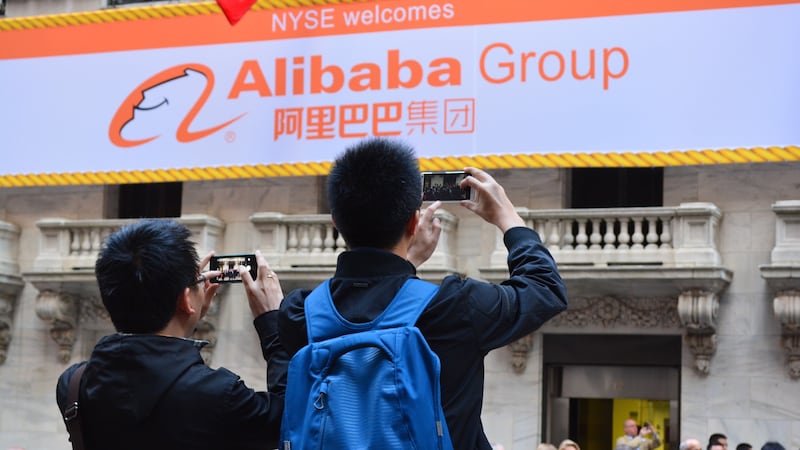
Source: Shutterstock
Alibaba Quarterly Results Beat Expectations
Alibaba Group Holdings reported results for the quarter ended December 31 2018, which included strong revenue growth of 41 percent year-on-year, and an increase of over 33 million mobile monthly active users across its platforms. However, the revenue boost marks its slowest pace in over two years, and confidence-boosting figures were thanks in part to a $3.3 billion accounting gain from a subsidiary's revaluation. Alibaba's results followed a "day of doom," where 20 companies warned investors that full-year figures would miss the mark. After a year-long slump, the group's shares rose 6.3 percent in the US, their highest since September, temporarily calming investors' slowdown-induced nerves. (Alizila)
Food and Culture Over Shopping: Chinese Travellers’ New Priorities
Though Chinese New Year traditionally means visiting family, many of China's experience-hungry consumers are choosing to travel with their loved ones instead: according to Chinese travel services provider Ctrip's annual Spring Festival Travel Trend Report, over 400 million trips will be making the most of the holiday by going on vacation. Domestic tourism is expected to boom this year thanks in part to the current consumption upgrade, and Ctrip revealed that over 91percent of its users opted for high-end travel packages, with a significant increase in private and customised tour groups. However, tourist-centric retail could take a hit: The China Tourism Research Institute found that tourists' spending across food, accommodation and culture entertainment in 2018 had increased year-on-year, whilst shopping expenditure fell from 34.34 percent to 16.48 percent. (CNR)
政治,经济,社会
POLITICS, ECONOMY, SOCIETY
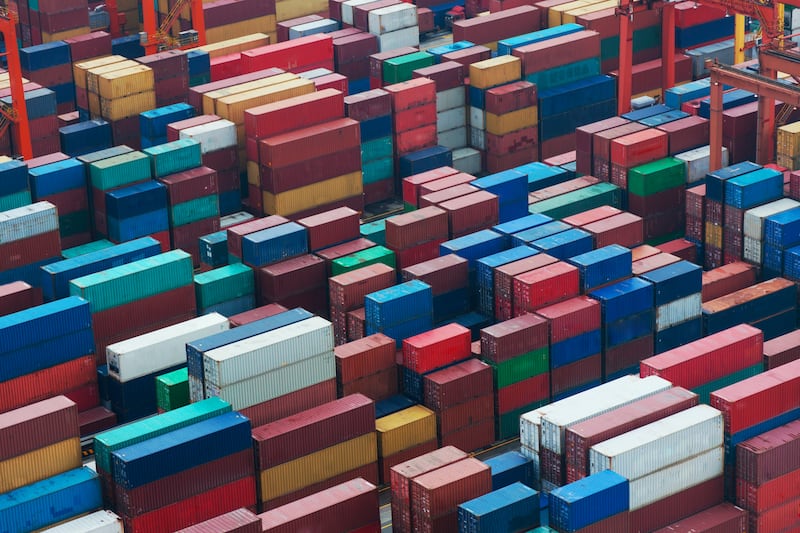
Cargo freight containers at Hong Kong's sea port | Source: Shutterstock
New Year, New Me: China Makes Goodwill Gestures to US, Canada
China's festive spirit may be rubbing off on its relations with the West. It was announced on February 2 that after two days of talks between President Trump and Chinese vice premier Liu He in Washington, two Chinese state-run purchases of one million tons of soybeans each are a show of goodwill, though no deal has been reached yet. Trump, speaking on January 31, said that China has committed to purchasing 5 million tonnes of soybeans in total, stated his belief that the two powers would come to "the biggest deal ever made." However, trade delegations have yet to delve into thornier matters relating to intellectual property, and the two sides are hoping to reach a deal by March to avoid further tariff escalations, which the US has specified will go from 10 percent to 25 percent on $200 billion worth of Chinese goods. During the holidays, Chinese diplomats extended an olive branch to Canada, expressing their intentions to mend relations between the two powers in the wake of tensions surrounding last year's arrest of Huawei executive Meng Wanzhou (Bloomberg, SCMP)
Singapore and China Building New Economic Hub for 500,000
Singapore is likely to continue its six-year streak as China's largest foreign investor, thanks to its latest investment. A joint venture between China and Singapore, "Knowledge City" is taking shape 45 minutes outside of Guangzhou, China's third largest city. The project is expected to house half a million in a sustainable urban development, and feature 18 schools and free office space. The two governments are hoping that the city will grow into an economic hub and attract Singapore's talent pool with subsidies for legal assistance and IPO coaching. If successful, the governments will apply the model to other rural areas in China and possibly abroad, but it's still early days — the hub is only in its first phase of development. (CNBC)
Chinese Company to Fund Tarantino Epic
Attention, film buffs: China's Bona Film Group is slated to co-finance Quentin Tarantino's long-anticipated next film, "Once Upon a Time in Hollywood." The Beijing-based studio will manage distribution of the film and cash into its global box office earnings, which are unlikely to disappoint upon US release in July, thanks to its star-studded cast featuring Brad Pitt, Leonardo DiCaprio, Margot Robbie, Al Pacino and more. Bona is far from the only Chinese player cashing in on films: this month, it was announced that Alibaba Pictures Group — the retail giant's film business arm — has co-produced and had a hand in funding Oscar-nominated "Green Book." Meanwhile, Tencent Pictures has invested and collaborated on "Bumblebee," "Wonder Woman" and "La La Land," as well as a Game of Thrones mobile game. It's only a matter of time before both mobile, desktop and silver screens are dominated by China's tech giants. (Hollywood Reporter)
China Decoded wants to hear from you. Send tips, suggestions, complaints and compliments to zoe.suen@businessoffashion.com.
With consumers tightening their belts in China, the battle between global fast fashion brands and local high street giants has intensified.
Investors are bracing for a steep slowdown in luxury sales when luxury companies report their first quarter results, reflecting lacklustre Chinese demand.
The French beauty giant’s two latest deals are part of a wider M&A push by global players to capture a larger slice of the China market, targeting buzzy high-end brands that offer products with distinctive Chinese elements.
Post-Covid spend by US tourists in Europe has surged past 2019 levels. Chinese travellers, by contrast, have largely favoured domestic and regional destinations like Hong Kong, Singapore and Japan.